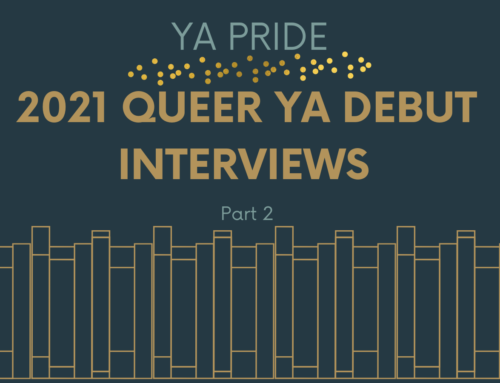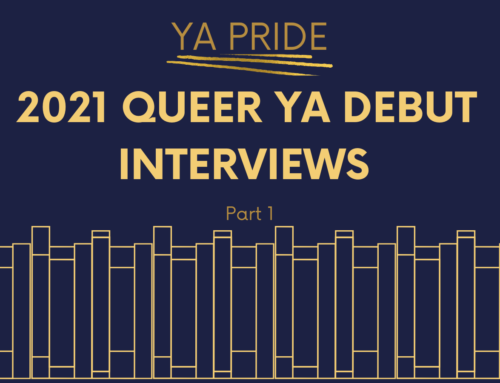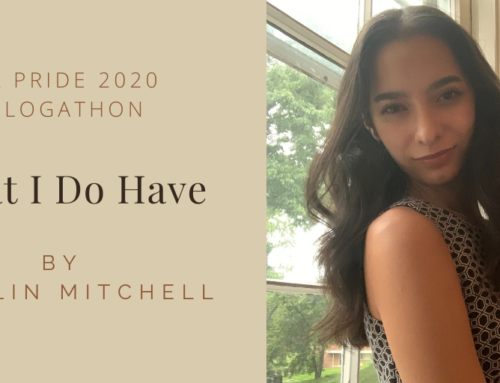Bisexual Awareness Week Series Day #3 – Previous Posts: Introduction — Duality, YA, and Crumpled Stickers — Let’s Push For More Nuanced Bi+ Representation
Not Your Sidekick by C.B. Lee & Hold by Rachel Davidson Leigh are both ALL THE WAY UP on our TBRs! Today, we’re so excited to have BOTH of these authors on GayYA!
Add Not Your Sidekick & Hold to your Goodreads TBR!
Buy/Pre-Order Not Your Sidekick & Hold!
CB: Hello! Thank you so much for having me on your blog, I’m very excited to be here. I’m C.B. and from California, with a passion for travel and hiking and the outdoors. My current novel is Not Your Sidekick, set in a post-apocalyptic world populated by superheroes, and Jess is struggling to find her place in it despite not having superpowers.
RDL: Hi! I’ll second that excitement! I’m Rachel, and my hobbies are much more sedentary. Think, reading, Netflix, and having staring contests with my dogs. My debut novel, Hold, is about a young man, Lucas Aday, who discovers he can stop time after his sister’s death.
How do you approach bisexuality in your books? Are your characters out, questioning, or in the closet?
CB: Jess is bi. She just is. I didn’t want to have the focus of the novel on questioning and coming out; I just wanted adventure and fun and romance. She “accidentally” comes out to her classmates when she’s a sophomore, but it isn’t a huge deal in the Not Your Sidekick universe. Sexuality in this particular future is interesting, but just about as interesting as who is crushing on who.
RDL: That’s awesome! Crushes are much more interesting. It’s actually pretty similar in Hold. Eddie, the second most prominent character in the novel, is bi and completely at ease with his sexuality. It’s still an important part of his identity, but it isn’t a part that causes any real angst, at least not over the course of the novel. All of the main characters are theater kids and, at one point, Eddie chooses a monologue because he’s excited to play someone who comes close to how he identifies. For him, bisexuality isn’t just about who he dates; it’s about who he is.
What about queerness more generally? Are there other forms of queer representation in your stories?
CB: Yeah! Well, Jess and her friends– kind of like mine in high school and college, we kind of flock together. Bells is trans and bisexual, Emma is demiromantic and Abby is a lesbian, but we’ll learn more about them and their particular identities as the series goes on. There’s a bit of interesting tension in their high school as we meet Darryl and the kids in the “Rainbow Allies” club. There’s a bit of biphobic microaggressions that come into play and it’s a very small part of the book, but I wanted to have those tidbits in there.
RDL: My book is big on the queer community too. There are four main characters– Luke, Eddie, Marcos, and Dee–and none of them are straight, because that’s often how it works. You find your people, particularly in high school. I know I did. The main character, Luke, is gay and other characters specifically ID as bi, queer, and asexual. Of the four main, one is still very much figuring out which label feels right and allowing him take that journey felt as important as letting all of the other characters be completely secure in their sexual identities.
Why was it important that your characters specifically identify on the page?
RDL: There’s a power in a name and a label, isn’t there? It allows us to find our place and our people, even if that place changes over time. On the flip side, we store a lot of fear in the things we don’t name, even when those absences come with the best intentions. It isn’t the right choice for every story or every author, but for these characters, I didn’t want queerness to be unspeakable.
CB: Yes, I definitely agree with Rachel. While not everyone fits a specific label, I think having those terms as parameters helps immensely, especially when you’re questioning and you don’t know where you are on the spectrum. It’s an immense relief to see someone who you identify with and be like, “Oh, that’s me.”
Can you see other aspects of yourself in your characters? What does it mean to tell those parts of your own story?
RDL: Yes and, also, absolutely not. On the one hand, I lost an older sibling in high school, and he was a lot like Luke’s older sister. I get that grieving process in a way that never took research. At the same time, Luke is also a seventeen year-old, male, transracial adoptee, which I am not. So, some parts of Hold took oodles of research, empathy, and time reaching outside of my own experience, while other parts started out so close, I could hardly see them clearly. Now, of course, I can see parts of myself in all of them.
CB: Yes, definitely. Like me, Jess is bisexual, and she also has my very specific heritage, albeit a version a hundred years in the future. She’s mixed Chinese and Vietnamese and I gave a lot of my experiences growing up, the disconnect between cultures, not being enough of one or the other, being too American or not American enough. Like Rachel, there are quite a few characters who I identify with on some aspect– being the child of immigrant parents, but of different racial backgrounds. Personality wise I think I gave different parts of myself to plenty of different characters, and it was fun explore that.
Where do you get your inspiration for stories and characters? What comes first?
RDL: I usually start with an image that I can’t shake. In this case, it was the room when Luke first stops time. He’s back at school for the first time, frustrated in ways he can’t explain, and when he throws his backpack at the wall, it doesn’t land. Ever. That’s the image I saw, and I think it’s still my favorite in the whole book. That’s the fear and the magic.
CB: I think the first image I thought of for Not Your Sidekick was the idea of someone interning for a supervillain, and not the glamorous tasks, either. And then the idea of that intern coming from a superhero background just made it even more hilarious, and it spiraled from there. The story and the plot came after as I thought about who these characters were– a lot of them were based off friends and how they interact with each other.
RDL: I definitely have one character whose personality was originally inspired by a friend. Now I have to wait and see if anyone calls me on it . . .
CB: Ahaha! Well, I deliberately told two of my friends that these specific characters are named for them, but personality-wise, they come from other friends, so we’ll see if they pick up on that.
Both of our upcoming novels have ties to superhero mythology. What is it about Superheroes that you found appealing? How do they feature in your novel?
CB: Superhero mythology is rife with identity and coming-of-age themes, especially when you mix together familiar tropes such as discovering your powers for the first time and defining who you are. As a teenager, I loved the X-Men, and really identified with how they talked about mutant powers. It fit so easily in with themes of coming out, being closeted, how society looks at you. Superhero mythology is amazing for starting conversations about themes like identity and more. In Not Your Sidekick, Jess struggles with who she with the possibility of being powerless in a superpowered family; it was a way for me to discuss high expectations and familial pressure in a way that was fun and lighthearted.
RDL: In Hold, Luke and his best friends are comics fans so, for them, superhero stories give them a way to understand the inexplicable things that are happening in their lives. As soon as Luke’s power appears, his friends want to him to go be a superhero, because of course they do! Grief and fear and random huge abilities are too big to comprehend, but if they think about Luke as a hero like Miss Marvel or Spiderman, it all starts to make more sense. Like a lot of readers, comics and superheros give them a way to move forward when their actual lives are way too confusing.
There are clear themes that run through both of our novels. How important would you say that those themes are, particularly when you’re writing? Do you design them or discover them as you go?
RDL: Hold weaves in a lot of big themes about moving forward after loss and how we find meaning in relationships, but I had to train myself not to write for them! My background is in teaching, so at first, I had to stop myself from writing from that perspective. I had to make myself be the author, trust the characters, and let readers fill in the gaps. Once I did that, the characters gave me those big beautiful themes all on their own.
CB: A little bit of both. I wanted Not Your Sidekick to open up a conversation about expectations and the concept of defining your own self-worth, but there were more themes that came up as I was writing. Unlike Rachel, my background isn’t in literature at all, but in earth science. Having an academic research initiative is helpful for worldbuilding, but a lot of the social themes came from my own desires to explore how this world played out.
CB, this is your second book and you’re hard at work on your third. Has your process changed since Seven Tears at High Tide?
CB: I like to think that my process has gotten more efficient, but the progress on my current novel says otherwise. I wrote much of Seven Tears in chronological order, start to finish, and then I went back and filled in more and more story. Not Your Sidekick took a dramatically different approach, as I wrote most of it during NanoWrimo. I wrote scenes as they came to me and then played fit-the-puzzle after Nano was over, and wrote in to fill in the gaps. Part of the process was because of the intense writing goals each day for Nano, where I’d just want to get words down. I do think this process works for me a lot, because there’s a lot of stress trying to get the “perfect” story arc from start to finish on the first go. I’m writing much of the second in the NYS series in the same way, in bits and pieces and then linking them all together.
Rachel, before Hold, you were published in the Summer Love short story anthology. Do you have a different writing process when you’re working on a novel as opposed to a short story?
RDL: I honestly don’t know! My writing process has changed so much since I wrote “Beautiful Monsters” and that’s less a factor of the genre and more a factor of time. That, plus the amazing readers who’ve made me better along the way. Now, when I write, I have ten other voices in my head telling me to “get to the action, already” and “knock it off with the gerunds.” You’d think it would be crowded, but it’s actually quite lovely.
Tonally, our books are very different. One is quite light while the other is fairly dark. Why did you make your particular choice, and what do you think your tone allows you to do?
RDL: Hold is NOT a lighthearted romp. I once described the story as an exploration of Luke’s pain. At the same time, the characters themselves are so funny. Luke and Eddie and the others can be goofy, sarcastic, and self-aware, but the book still deals with a heavy time in all of their lives. As anyone who’s lost someone can attest, the grieving process is filled with these bursts of dark, inappropriate humor. The process of reconciling loss with life can be ridiculous, especially when you have friends, like Luke does, who will do anything to bring him back into the world.
CB: I wanted the tone of Not Your Sidekick to be light and fun, primarily because in recent years much of our media that revolves around superheroes has tended to be “dark and gritty” reboots. While there is value in those stories, I don’t want all of my media to be grimdark. I think there’s a value in fun and ridiculousness, and I play up the cheese factor a lot in the novel, poking fun at the genre and at my own story. There are heavier moments, and the characters learn and grow but I think the lighthearted tone allows for a lot of development. One of the things I’m working on as a writer is to get better at the heavier subjects like Rachel; until then, I stick to my strengths.
RDL: And I’d like to get better at just letting the light things be light and delightful! With our powers combined, we will be unstoppable.
CB: Clearly this calls for a collaboration. 😉




